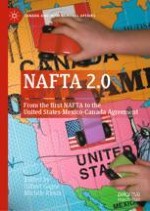2022 | OriginalPaper | Chapter
11. NAFTA and the Environment: Decades of Measured Progress
Authors : Noémie Laurens, Zachary Dove, Jean-Frédéric Morin, Sikina Jinnah
Published in: NAFTA 2.0
Publisher: Springer International Publishing
Activate our intelligent search to find suitable subject content or patents.
Select sections of text to find matching patents with Artificial Intelligence. powered by
Select sections of text to find additional relevant content using AI-assisted search. powered by
